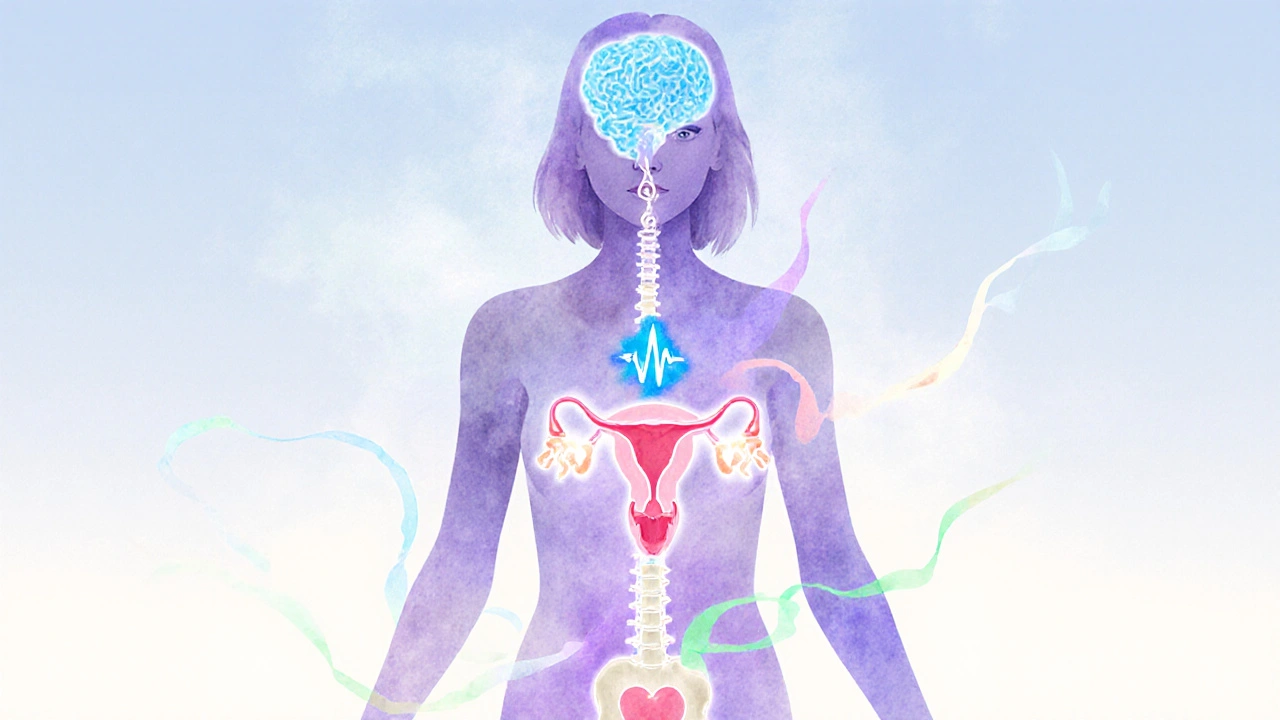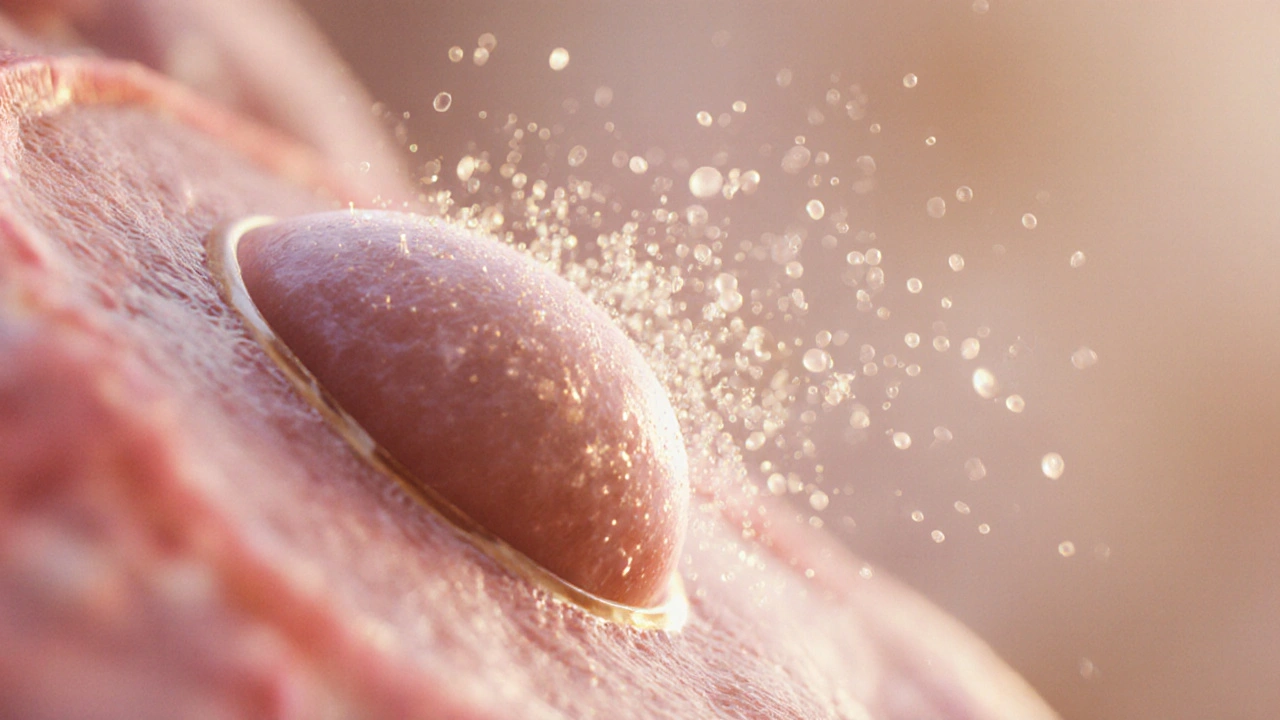When we talk about hormone health, Progesterone is a steroid hormone produced mainly by the ovaries after ovulation, and in smaller amounts by the adrenal glands and placenta. It’s often called the "calming" partner of estrogen because it helps keep the hormonal system steady. Understanding why progesterone matters is the first step toward feeling balanced every day.
Key Takeaways
- Progesterone balances estrogen and supports the menstrual cycle.
- Low progesterone can affect mood, sleep, bone density, and heart health.
- Nutrition, stress management, and sleep are the three biggest natural boosters.
- Bioidentical hormone therapy contains a form of progesterone that mirrors the body’s own.
- Testing and a simple symptom checklist help you decide if intervention is needed.
What Is Progesterone?
In simple terms, progesterone is the hormone that tells the uterine lining to get ready for a possible pregnancy. It rises after ovulation during the luteal phase of the menstrual cycle the monthly sequence of hormonal changes that prepares the body for fertilization. If pregnancy occurs, progesterone levels stay high to sustain the placenta; if not, they drop, triggering your period.
How Progesterone Keeps Hormonal Balance
Estrogen and progesterone work as a seesaw. When estrogen spikes, progesterone pushes back, preventing overstimulation of the uterus and keeping other systems in check. This tug‑of‑war also influences the hypothalamic‑pituitary‑adrenal (HPA) axis, meaning that adequate progesterone can lower cortisol spikes and help you stay calm under stress.
Health Areas Directly Affected by Progesterone
Beyond the reproductive system, progesterone touches many body parts.
- Pregnancy the condition of carrying a developing embryo or fetus: Progesterone maintains the uterine lining and reduces uterine contractions, crucial for a healthy gestation.
- Bone health the strength and density of the skeletal system: It works with estrogen to promote calcium retention, lowering osteoporosis risk.
- Mood the emotional state influenced by brain chemistry: Higher progesterone can increase GABA activity, which has a calming, anti‑anxiety effect.
- Sleep the restorative cycle of rest essential for health: It promotes deeper REM cycles and can reduce nighttime awakenings.
- Cardiovascular health: Progesterone improves arterial flexibility and can modestly lower LDL cholesterol.

Signs of Low Progesterone
When the hormone dips, several patterns emerge. Common clues include irregular periods, short luteal phases (less than 10 days), spotting before a period, anxiety, low libido, poor sleep, and frequent migraines. Some women also notice weight gain around the hips and thighs, which ties back to its role in regulating fluid balance.
What Causes a Deficiency?
Age is a big factor-ovarian progesterone production naturally declines after the mid‑30s. Chronic stress also hijacks the HPA axis, diverting progesterone precursors toward cortisol. Nutrient gaps, especially low vitamin B6, magnesium, and zinc, limit the body’s ability to synthesize the hormone. Certain medications, such as some birth control pills or glucocorticoids, can suppress natural progesterone too.
Natural Ways to Support Progesterone Production
Three lifestyle pillars raise your internal progesterone without a prescription.
- Nutrition: Include foods rich in vitamin B6 (like chickpeas, bananas, and tuna), magnesium (spinach, pumpkin seeds), and zinc (oysters, beef). Healthy fats-especially omega‑3s from salmon or flaxseed-provide the cholesterol backbone needed for steroid hormone synthesis.
- Stress Management: Practices such as mindfulness meditation, yoga, or even a 10‑minute walk can lower cortisol, freeing up more pregnenolone to become progesterone.
- Sleep Hygiene: Aim for 7‑9 hours of uninterrupted rest. Darkness, a cool room, and limiting blue‑light exposure support the night‑time rise of melatonin, which indirectly supports progesterone stability.

Supplementation Options
If lifestyle tweaks aren’t enough, targeted supplementation may help.
| Form | Source | Key Benefits | Potential Drawbacks |
|---|---|---|---|
| Bioidentical hormone therapy | Compounded plant‑derived progesterone structurally identical to natural hormone | Exact dosing, mimics body’s rhythm, good for menopausal symptoms | Requires prescription, occasional skin irritation with creams |
| Progesterone cream (over‑the‑counter) | Derived from wild yam (often not true progesterone) | Easy topical use, low systemic absorption | Variable potency, may not raise blood levels enough |
| Oral micronized progesterone | Synthetic but chemically identical to endogenous progesterone | Well‑studied, helps with sleep and menstrual regulation | Can cause drowsiness, occasional digestive upset |
For most women seeking a balance, a low‑dose micronized oral pill or a prescription bioidentical cream provides the most reliable results. Always discuss dosage with a qualified practitioner and consider baseline blood testing (serum progesterone measured in the luteal phase).
Quick Symptom Checklist
- Irregular or missed periods?
- Spotting between cycles?
- Frequent anxiety or mood swings?
- Difficulty staying asleep?
- Low libido or reduced sexual desire?
- Weight gain around hips/thighs despite diet?
If you answered “yes” to three or more, it’s worth getting a hormonal panel. The results guide whether lifestyle changes, nutrients, or targeted therapy are the best next step.
Next Steps for Different Readers
For women in their 20s‑30s: Focus on diet, stress, and sleep first. Re‑check symptoms after three months.
For women approaching menopause: Consider a low‑dose bioidentical progesterone regimen, especially if hot flashes or night sweats accompany low progesterone.
For athletes or high‑stress professionals: Integrate magnesium supplementation (300‑400mg nightly) and a brief daily mindfulness practice to protect hormone production.
Frequently Asked Questions
Can men benefit from progesterone?
Yes, men produce small amounts of progesterone in the adrenal glands. It serves as a precursor for testosterone and can influence mood and sleep. However, supplementation is rarely needed unless a specific endocrine disorder is diagnosed.
Is it safe to use over‑the‑counter progesterone creams?
Most OTC creams are made from wild yam extract, which the body cannot convert into real progesterone without enzymatic activity it lacks. They may offer a placebo effect but typically do not raise serum progesterone. For therapeutic purposes, prescription‑grade bioidentical products are preferred.
How long does it take to see results after starting progesterone therapy?
Oral micronized progesterone often improves sleep and mood within 1‑2 weeks. Menstrual cycle regulation may take 1‑2 full cycles (about 2 months). Tracking symptoms in a journal helps gauge progress.
What foods naturally boost progesterone?
Foods rich in vitamin B6 (chickpeas, potatoes, turkey), magnesium (dark leafy greens, nuts, seeds), zinc (shellfish, beef), and healthy fats (avocado, olives, fatty fish) provide the building blocks needed for progesterone synthesis.
Can high stress lower progesterone permanently?
Chronic stress diverts pregnenolone toward cortisol, lowering progesterone short‑term. If the stress persists for months, the body may adapt, keeping progesterone low. Consistent stress‑reduction practices can reverse the effect over time.


Dhanu Sharma
October 12, 2025 AT 04:25Low progesterone can mess with sleep and mood.
Edward Webb
October 14, 2025 AT 11:58It is striking how progesterone works as a counterbalance to estrogen, creating a hormonal seesaw that stabilizes mood. When the luteal phase is short, the body lacks the calming GABA‑mediated effect that progesterone normally provides. This deficiency often manifests as heightened anxiety or restless nights, which can be misattributed to purely psychological factors. Incorporating B‑vitamin‑rich foods, such as chickpeas and leafy greens, supplies the necessary co‑factors for steroidogenesis. A measured approach that blends nutrition, stress reduction, and adequate sleep tends to restore the natural rhythm without immediate pharmacological intervention.
Snehal Suhane
October 16, 2025 AT 13:58Oh sure, just sprinkle some pumpkin seeds on your salad and suddenly you’re a hormonal guru – as if the body didn’t have a PhD in chemistry. The idea that a handful of zinc will fix every mood swing is laughably naive, especially when most of us are juggling 9‑to‑5 jobs and Netflix binges. And let’s not even start on the “miracle” bioidentical creams that promise earth‑shattering results while your wallet cries. In reality, consistency in sleep and stress management beats any fad by a mile. So maybe try a walk before you write your next “expert” blog post.
Ernie Rogers
October 18, 2025 AT 13:11American women are always chasing the latest hormone fad instead of looking at good old common sense diet. It’s funny how the market pushes creams that cost a fortune while a simple bowl of oatmeal does the job. We could learn a thing or two from cultures that don’t over‑medicate their hormones. The stress of modern life is a big part of the problem, not some mysterious “low progesterone” epidemic. Maybe we should focus on lifestyle before blaming hormones for everything.
Eunice Suess
October 20, 2025 AT 09:38Did you notice the egregious misuse of the term “bioidentical” when the article fails to distinguish it from synthetic analogues? It’s not just a minor slip; it reflects a deeper disregard for endocrine precision. Moreover, the sentence “Progesterone improves arterial flexibility and can modestly lower LDL cholesterol” lacks a proper citation, rendering it speculative at best. While the piece mentions “vitamin B6, magnesium, and zinc,” it neglects to clarify that these micronutrients act as cofactors in the conversion of pregnenolone to progesterone – a crucial biochemical detail! Let’s demand rigor and clarity, especially when discussing something as vital as hormonal health.
Anoop Choradia
October 22, 2025 AT 03:18It is incumbent upon the discerning reader to recognize that the discourse surrounding progesterone is not solely a matter of biochemistry but also an intricate tapestry woven by vested interests. The pharmaceutical industry, with its labyrinthine patent structures, has long profited from positioning synthetic analogues as the panacea for a plethora of ailments, thereby marginalizing naturalistic approaches. A thorough examination of peer‑reviewed literature reveals a conspicuous paucity of long‑term safety data on micronized oral progesterone, suggesting a strategic suppression of adverse findings. Concurrently, the marketing of “bioidentical” compounds enjoys a veneer of legitimacy, yet the regulatory oversight remains conspicuously lax, enabling manufacturers to make unsubstantiated claims. Moreover, the omission of a comprehensive discussion on the endocrine disruptors pervasive in modern diets serves to obfuscate the true etiological factors contributing to progesterone deficiency. It is well‑documented that chronic exposure to bisphenol‑A and phthalates interferes with steroidogenesis, yet the article merely glances over this point. The narrative also neglects to address the geopolitical dimensions of hormone therapy, wherein the United States’ FDA policies diverge markedly from those of the European Medicines Agency, often to the advantage of domestic pharmaceutical conglomerates. In addition, the reliance on self‑reported symptom checklists, while valuable, can be co‑opted by commercial entities to create a market for over‑the‑counter supplements that lack rigorous standardization. Notably, the table delineating progesterone supplement options fails to disclose the variability in bioavailability inherent to transdermal versus oral delivery systems, a critical omission given the pharmacokinetic implications. The article’s emphasis on magnesium and zinc as “natural boosters” is scientifically sound; however, it conspicuously omits the role of dietary phytoestrogens, which may antagonize progesterone receptors, thereby undermining the purported benefits. Furthermore, the claim that “healthy fats provide the cholesterol backbone needed for steroid hormone synthesis” is accurate, yet it sidesteps the fact that excessive saturated fat consumption can exacerbate inflammatory pathways, indirectly impairing hormonal equilibrium. The discourse also briefly mentions stress management as a pillar of progesterone support, but it fails to elucidate the mechanistic pathway through which chronic cortisol elevation preferentially shunts pregnenolone towards glucocorticoid synthesis-a phenomenon well‑established in psychoneuroendocrinology. By presenting a fragmented view that selectively highlights favorable data while neglecting discordant evidence, the article inadvertently perpetuates a narrative that serves commercial interests more than patient empowerment. Consequently, readers are urged to adopt a critical stance, seek independent laboratory testing, and consult practitioners who prioritize evidence‑based, integrative strategies over proprietary hormone formulations. Only through such vigilant scrutiny can we hope to disentangle genuine therapeutic value from the veils of profit‑driven promotion.
bhavani pitta
October 23, 2025 AT 18:11While the grammatical concerns raised are valid, it would be remiss to overlook the practical implications of the nutritional recommendations. The article’s emphasis on B6, magnesium, and zinc aligns with established metabolic pathways and offers actionable guidance. However, the assertion that “progesterone creams are merely placebo” lacks nuance, as transdermal absorption can vary widely among individuals. Thus, a balanced perspective acknowledges both the limitations and potential benefits of topical formulations. In light of this, clinicians should individualize treatment rather than adhere rigidly to a singular viewpoint.
duncan hines
October 25, 2025 AT 06:18Analyzing the data presented, it becomes clear that the author cherry‑picks studies that support their agenda while ignoring contradictory findings. The dramatic tone about “hormonal balance” masks the fact that many of the cited benefits are based on small cohort trials. Moreover, the claim that “progesterone improves bone density” is overstated without longitudinal data. This selective reporting inflates expectations and could mislead readers seeking evidence‑based solutions. A more rigorous, unbiased analysis would temper the hype with realistic caveats.
Mina Berens
October 26, 2025 AT 14:38Totally love the focus on sleep 💤 and stress 🌱 – those are the real game changers for hormone health! Adding a handful of pumpkin seeds to your morning smoothie can boost magnesium 📈, and a quick meditation before bed does wonders. Keep it simple and listen to your body 🌟.
Chris Meredith
October 27, 2025 AT 21:11Team, let’s leverage the endocrine feedback loops by dialing in macro‑nutrient timing and stress‑reduction protocols. Optimizing the luteal phase hormone milieu requires a synergistic stack: high‑quality omega‑3s, B‑vitamin complex, and consistent circadian hygiene. By integrating progressive overload on your wellness regimen-think HIIT cardio paired with mindfulness drills-you’ll fortify the hypothalamic‑pituitary‑adrenal axis, thereby preserving pregnenolone flux toward progesterone synthesis. Remember, the substrate availability dictates output; ensure cholesterol precursors aren’t throttled by dietary excesses. Consistency is the catalyst; track your metrics weekly and iterate for maximal hormonal resilience.
Jessie Eerens
October 29, 2025 AT 00:58Consider, then, the delicate equilibrium that exists within the human endocrine tapestry, where progesterone acts as a silent moderator, tempering the exuberance of estrogen; yet, when this balance is perturbed, the reverberations echo through sleep, mood, and even cardiovascular health; therefore, one must contemplate not merely the symptomatic manifestations, but the underlying biochemical symphony that orchestrates our very being.
Caroline Lane
October 30, 2025 AT 01:58Honestly, it’s frustrating how many people chase quick‑fix pills instead of taking responsibility for their own lifestyle. You can’t blame hormones for every bad habit, you know? Eat right, get some sleep, and stop making excuses. The market loves to sell you creams that do nothing while you stay stuck in the same cycle.
Ellie Haynal
October 31, 2025 AT 00:11It’s downright irresponsible to perpetuate the myth that a cheap cream will magically fix hormonal chaos. People need to wake up to the fact that true balance comes from disciplined habits, not from slick marketing. If you keep feeding into the hype, you’re only deepening the problem. Let’s demand accountability from both consumers and manufacturers.
Jimmy Gammell
October 31, 2025 AT 19:38Hey there! You’re on the right track by looking into nutrition and stress management 😊. Small steps like adding a magnesium supplement before bed can really improve sleep quality. Keep tracking your progress and stay positive! 👍
fred warner
November 1, 2025 AT 12:18Fantastic effort! By committing to consistent sleep hygiene and mindful eating, you’re laying a strong foundation for hormonal health. Remember, every positive habit compounds over time, leading to lasting balance. Keep up the great work and celebrate each win!